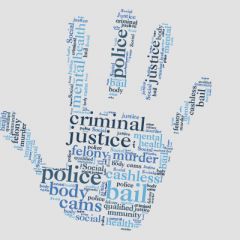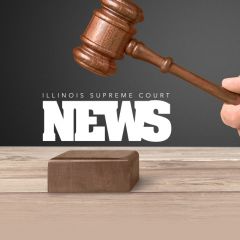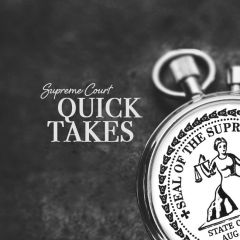This is part one of a three-part video series on the Illinois Supreme Court’s remote access policy and e-filing developments, presented by the ISBA’s Standing Committee on Legal Technology.
Practice News
-
May 5, 2021 |
Practice News
-
May 3, 2021 | Practice News

This May’s Illinois Bar Journal cover story examines the state’s sweeping criminal justice reforms signed into law earlier this year by Gov. Pritzker. The IBJ interviewed defense attorneys, prosecutors, and others who reflected on the legislation. “Some people view it as, ‘They threw every reform into this sausage maker, and this is what came out,’” Stephen Baker, a retired Cook County public defender and member of the Illinois State Bar Association’s Criminal Justice Section Council, told the IBJ. “Some people take the position that, if you wanted a massive change, the time to do it is now. People are just fed up with the conduct of the police. And the train is leaving the station; if you don’t want to get on, get out of the way.” Others spoke optimistically about the reforms: “The breadth of the bill is one of its strong points,” says Jerrod Williams, a judicial clerk and member of the ISBA Steering Committee on Racial Inequality. “Solving the problems of crime and law enforcement requires a multi-front approach. I don’t believe law enforcement alone—that is, prosecuting offenders—is in and of itself a solution to crime. It’s a piece of the solution.”
-
April 26, 2021 | Practice News

The Illinois Supreme Court’s Illinois Judicial Conference (IJC) announced today the release of a new jury orientation video which will serve as an introduction to jury service for all 24 circuit courts in Illinois.
-
April 26, 2021 | Practice News

A lawyer on a Zoom videoconference with other attorneys has to take a phone call during the meeting. But he forgets to press mute as he begins to discuss details of a high-stakes negotiation with the person on the phone. Lots of arm waving from the other Zoom participants ensues, but to no avail. Also, the Zoom host had left the room, leaving no one with the power to mute the attorney. Did the loquacious lawyer breach his duties to his client? What were the duties, if any, of the innocent lawyer-bystanders who were now in possession of very significant information? What about the opposing party in the real estate transaction, were she to be presented with this information? In his April Illinois Bar Journal ethics column, “No, I Am Not a Cat,” Illinois State Bar Association General Counsel Charles Northrup examines this situation—a new twist on the old “errant fax” issue made more unique by now-widely used technology.
-
April 22, 2021 | Practice News

Our panel of leading appellate attorneys reviews the Illinois Supreme Court opinion handed down Wednesday, April 21. In Elam v. The Municipal Officers Electoral Board for the Village of Riverdale, the Supreme Court affirmed the decision of the Municipal Officers Electoral Board for the Village of Riverdale invalidating a candidate’s eligibility to run for village trustee in the general election because of invalid signatures on his nominating petition.
-
April 19, 2021 | Practice News

While cash bail may be going away in Illinois, other pretrial release requirements remain. In his April Illinois Bar Journal article, “What Is So Special About a Bond Review?,” Jarrad Woodson reinforces why a bond review may set the tone and control pressure points of your client’s case from the very beginning. If your clients cannot afford their bail, or if bail is denied, the burden of getting them out of custody will always be present. Even if your client is waiting the case out from home, the conditions of bond could be so oppressive they make your client a prisoner there as well. Therefore, arguing effectively at the bond review stage is crucial. Your client already went through bond court, so why ask for a bond review? Ideally, Woodson notes, officials at the bond-court level do their best to work together for a fair initial bond, but sometimes this does not happen. The bond court churns and turns cases quickly. Important information about a defendant can get misplaced. This is where the beauty of bond reviews come in: You get another chance.
-
April 16, 2021 | Practice News

Our panel of leading appellate attorneys reviews the five Illinois Supreme Court opinions handed down Thursday, April 15.
-
April 14, 2021 | Practice News

The Illinois State Bar Association invites Young Lawyers Division (YLD) attorney members to establish yourselves as experts in your practice area and compete for your share of $3,500 in prize money by entering the Annual Lincoln Award Legal Writing Contest.
Submissions should be useful, practical articles on topics important to practicing lawyers. Submissions will be considered for publication in the Illinois Bar Journal.
-
April 12, 2021 | Practice News

Traditionally a safeguard exclusively available to journalists, shield laws in many jurisdictions have gradually broadened in scope and now protect material generated and relied upon by many professionals when conducting research for publication. But according to Daniel Schwartz in his April Illinois Bar Journal article, “Discovery Orders and the Peer-Review Privilege,” few cases in Illinois discuss the applicability of shield laws to medical research. Whether—and to what extent—medical research is discoverable therefore remains an unsettled issue, Schwartz argues. To bring coherency to Illinois law governing discovery requests for medical research, Schwartz examines discovery requests litigated under the Illinois Medical Studies Act and several state and federal discovery provisions. He also highlights the factual and doctrinal significance of the cases discussed and notes important considerations for legal practitioners seeking to issue or bar a request to produce medical research.
-
April 6, 2021 | Practice News

The Illinois Supreme Court announced today amendments to Order M.R. 30370 regarding residential evictions. The Illinois Judicial Conference’s Court Operations During COVID-19 Task Force (Task Force) recommended these amendments to the Court in order to better clarify the standard for residential evictions impacted by the governor’s executive orders.
2 comments (Most recent April 7, 2021)

